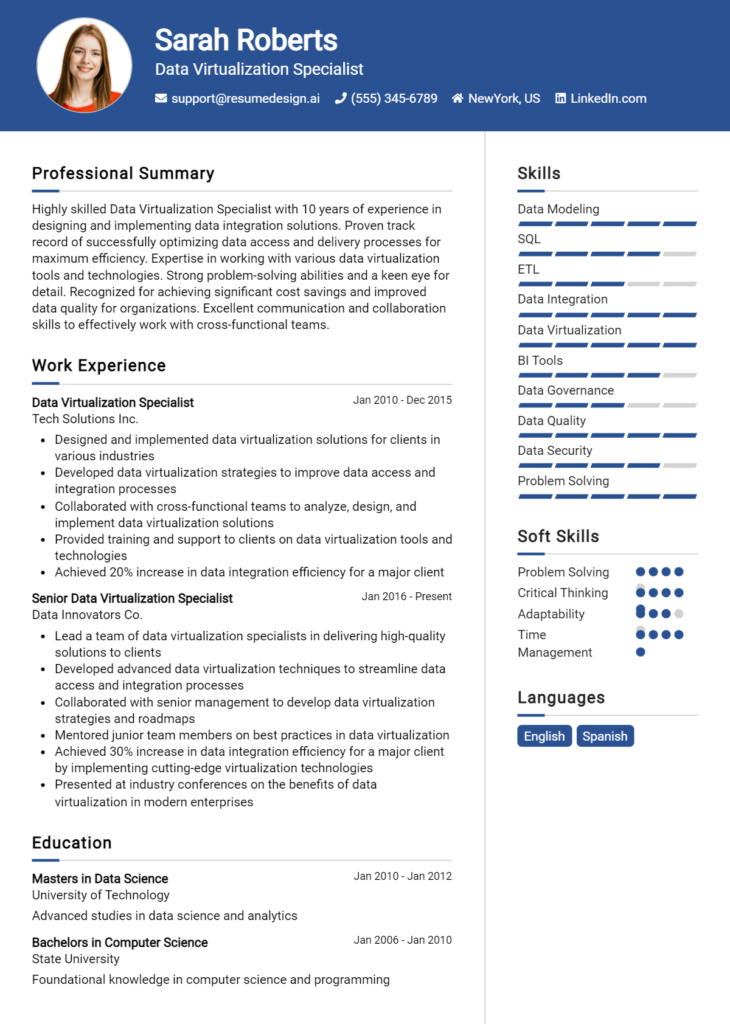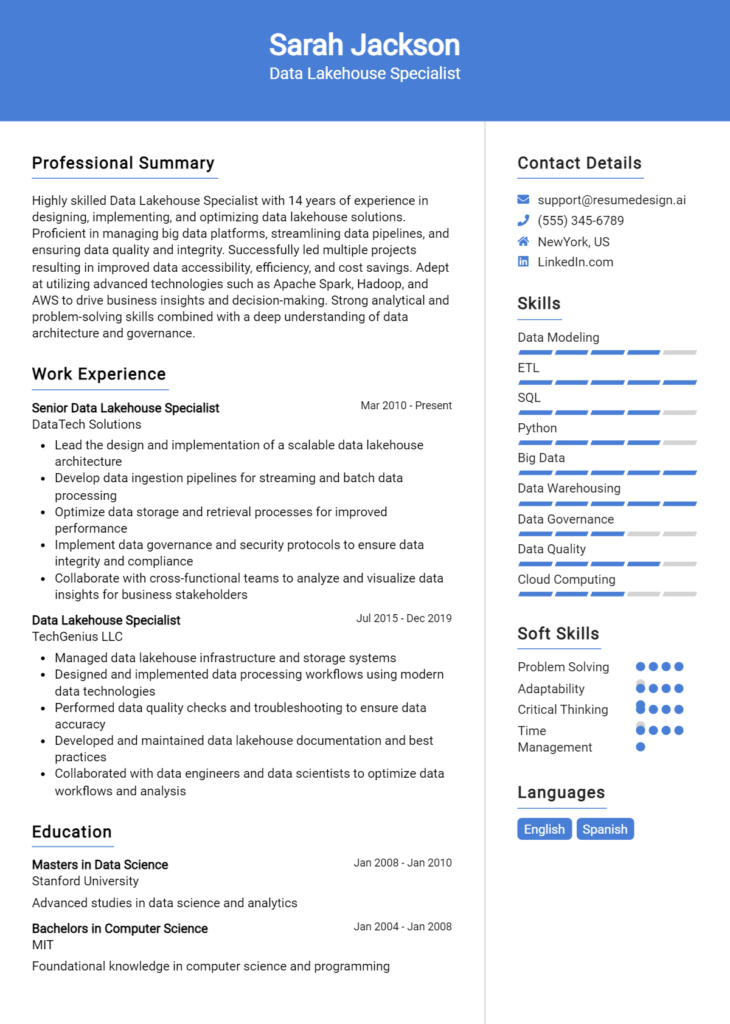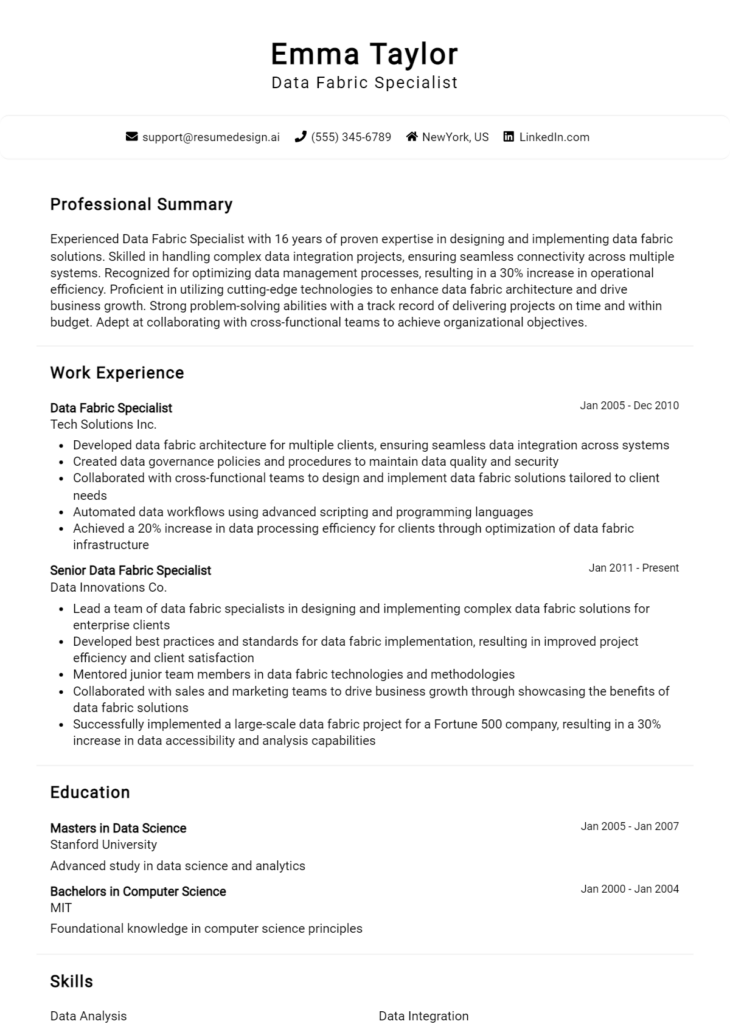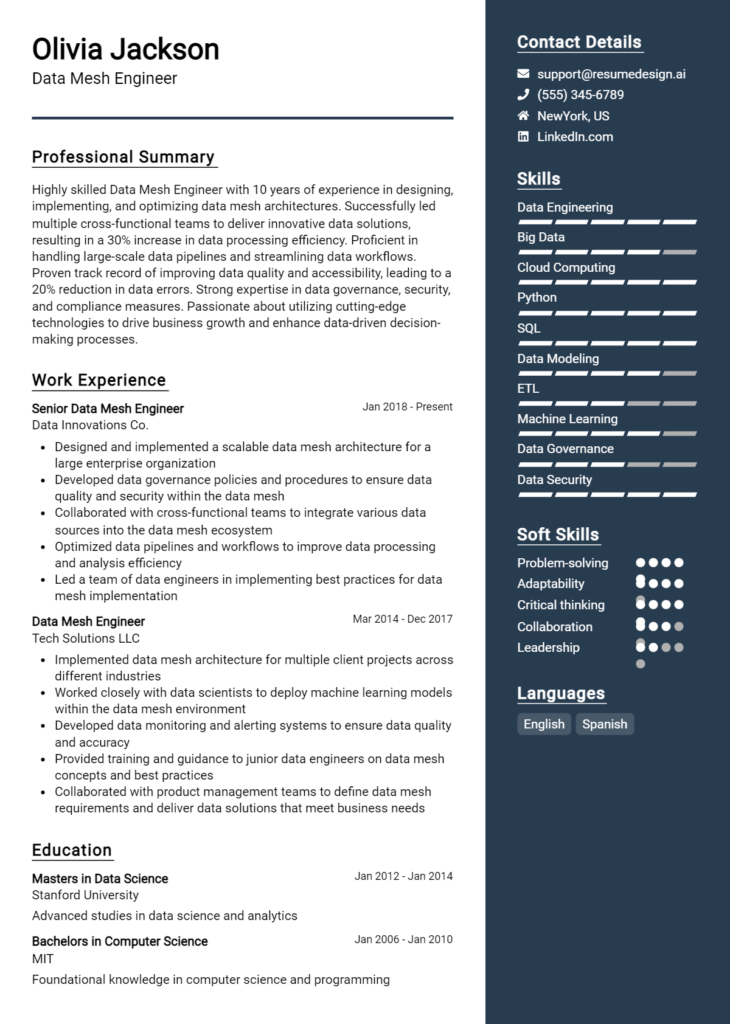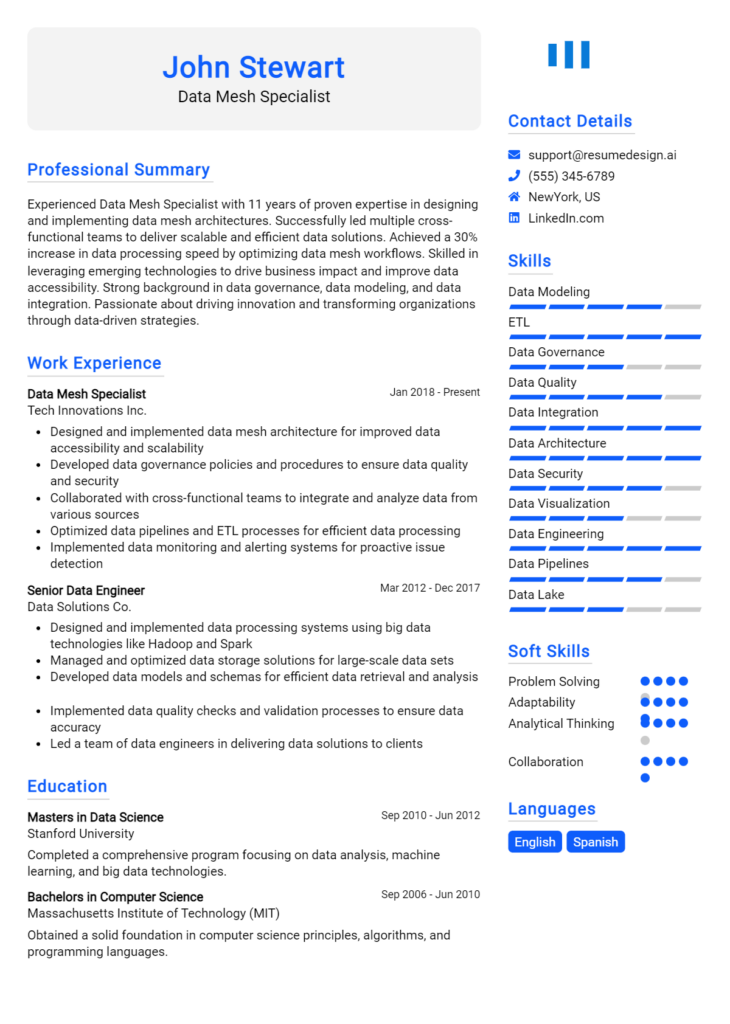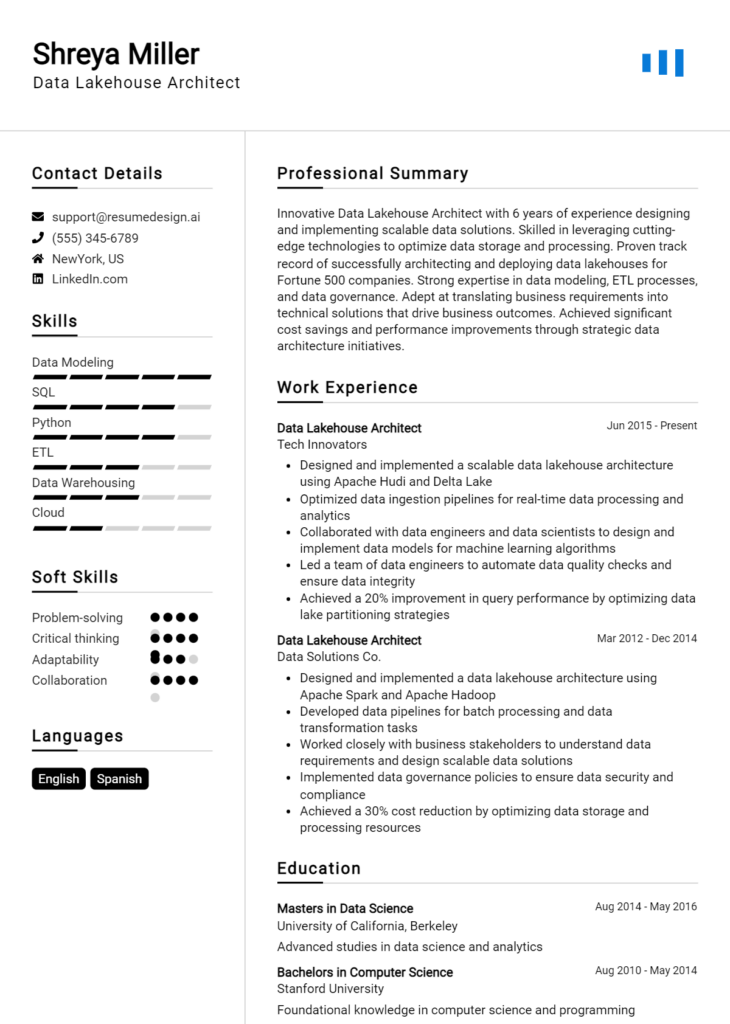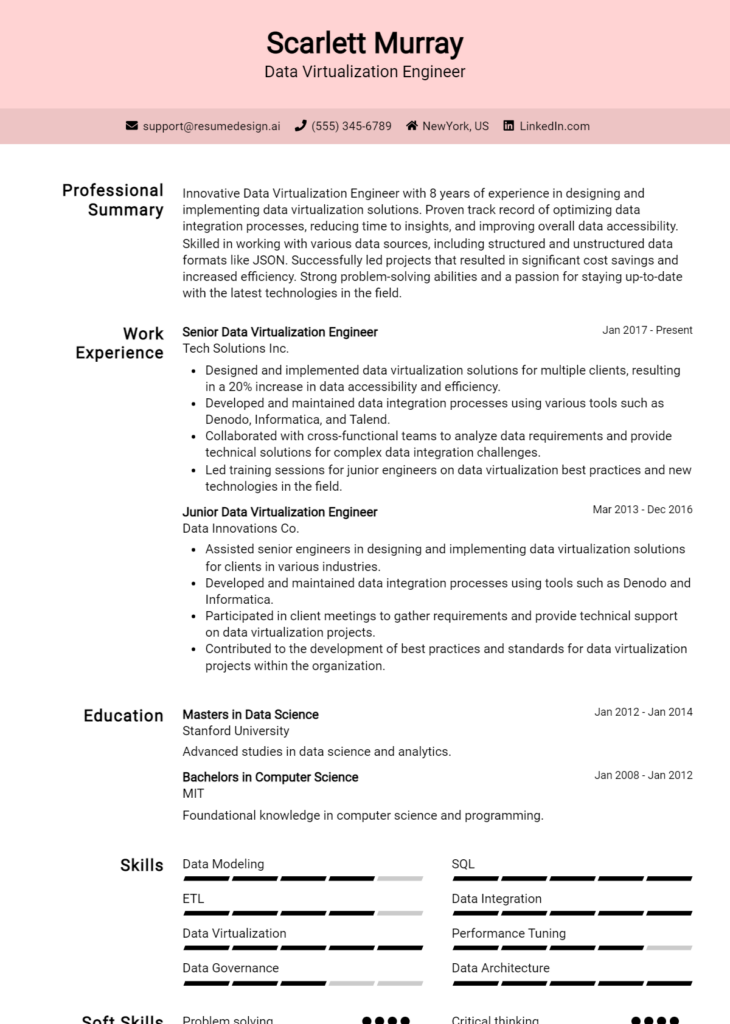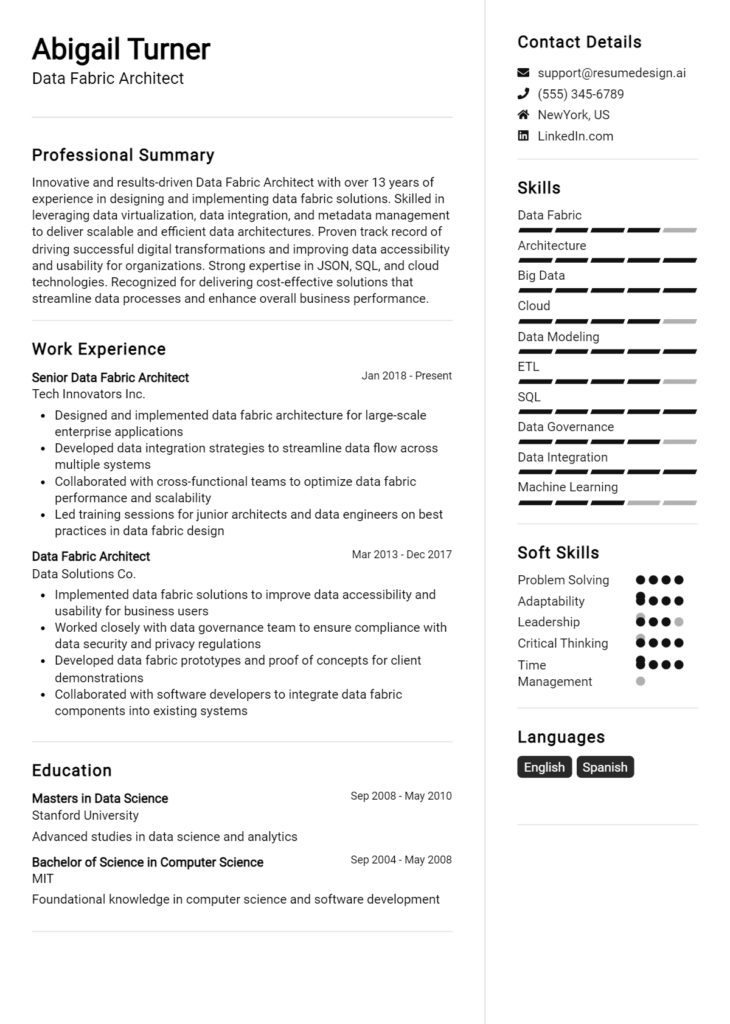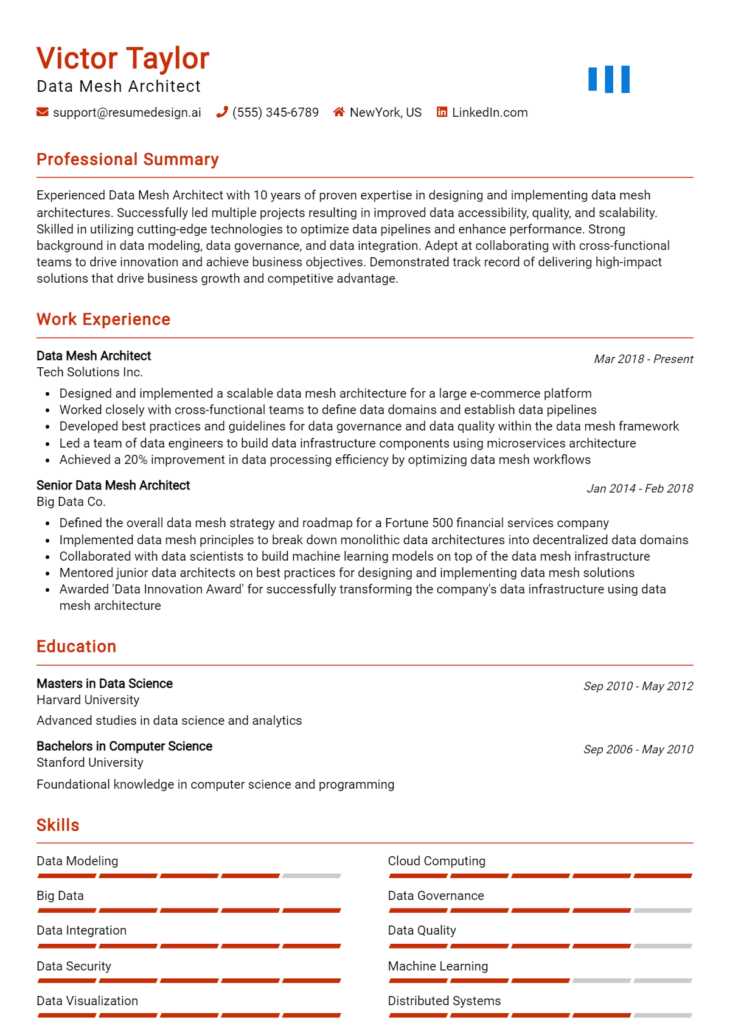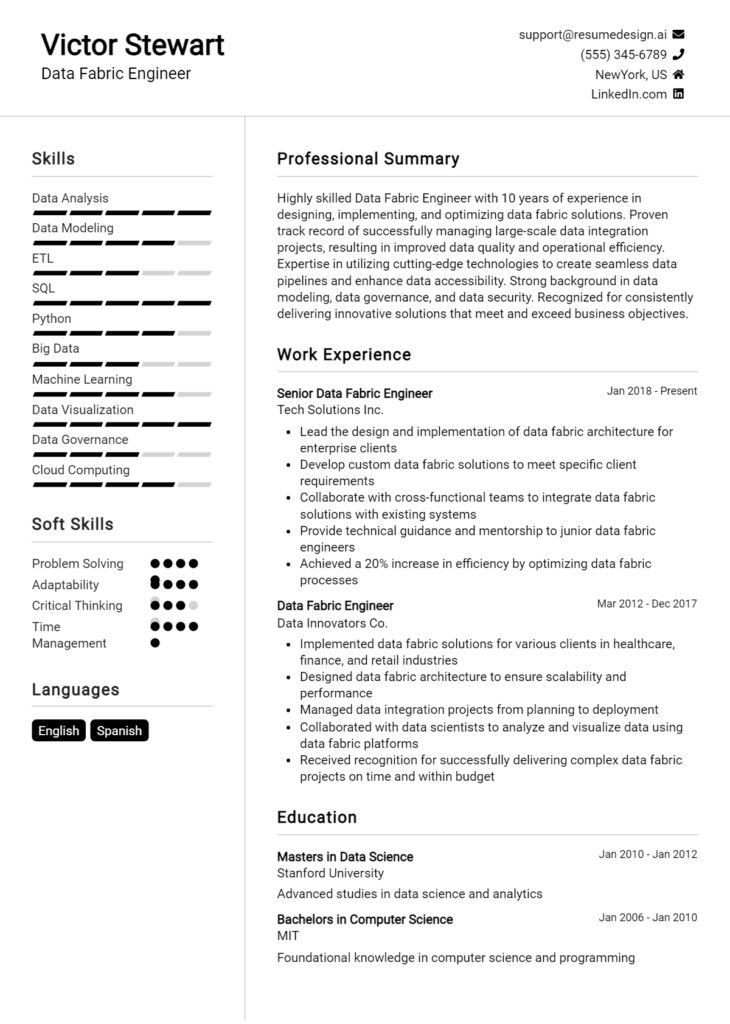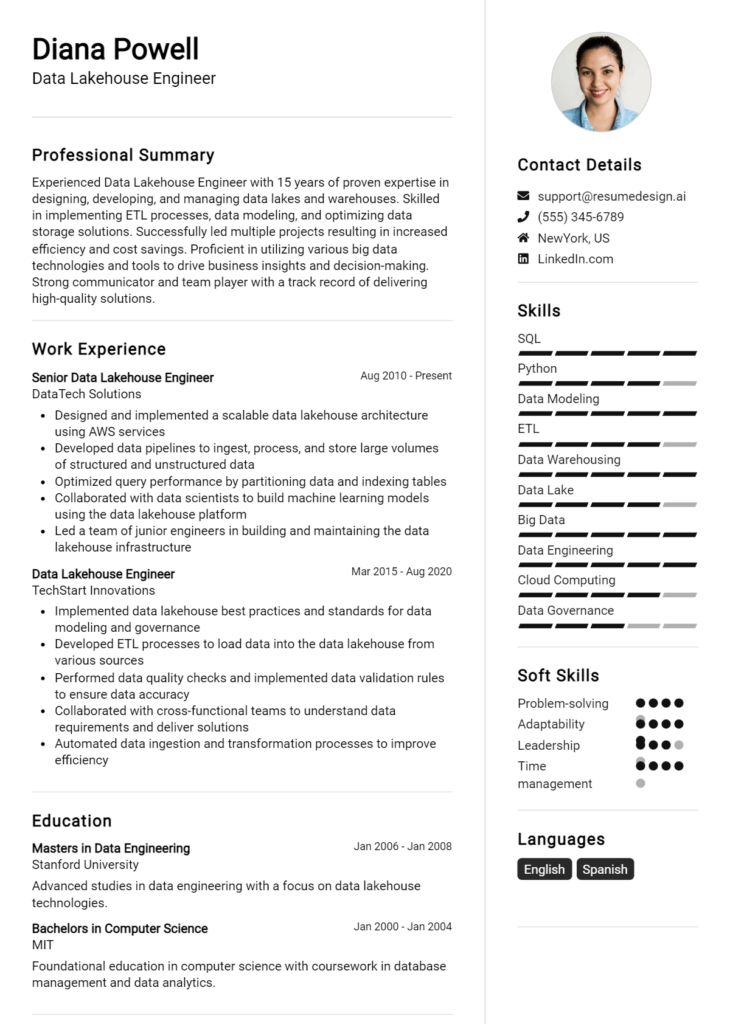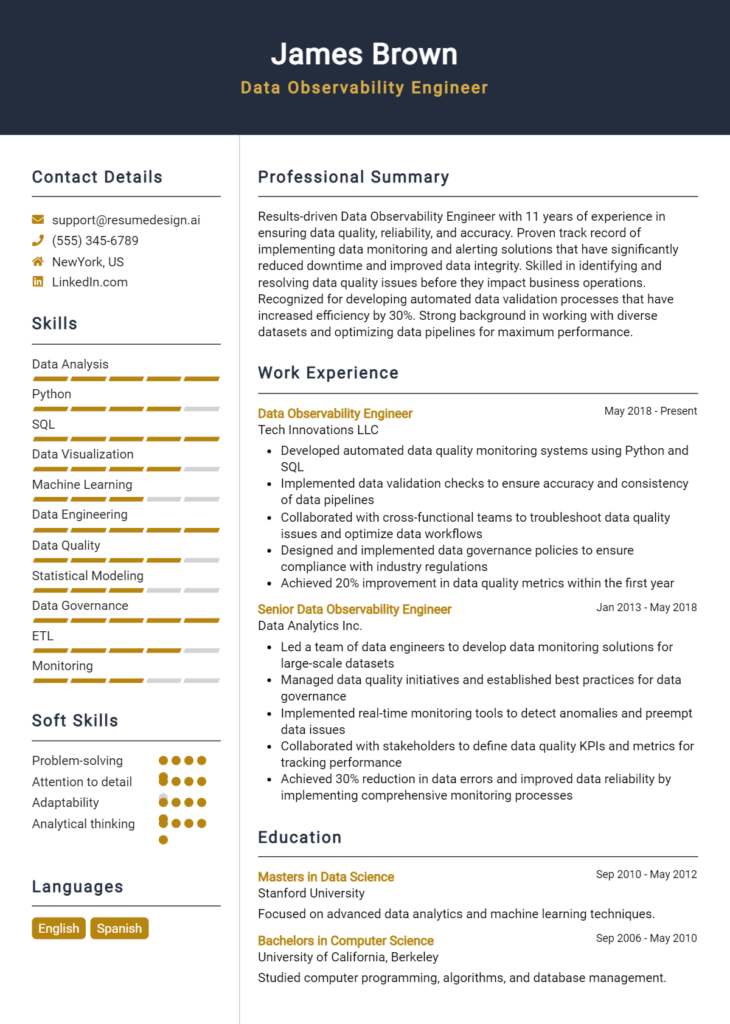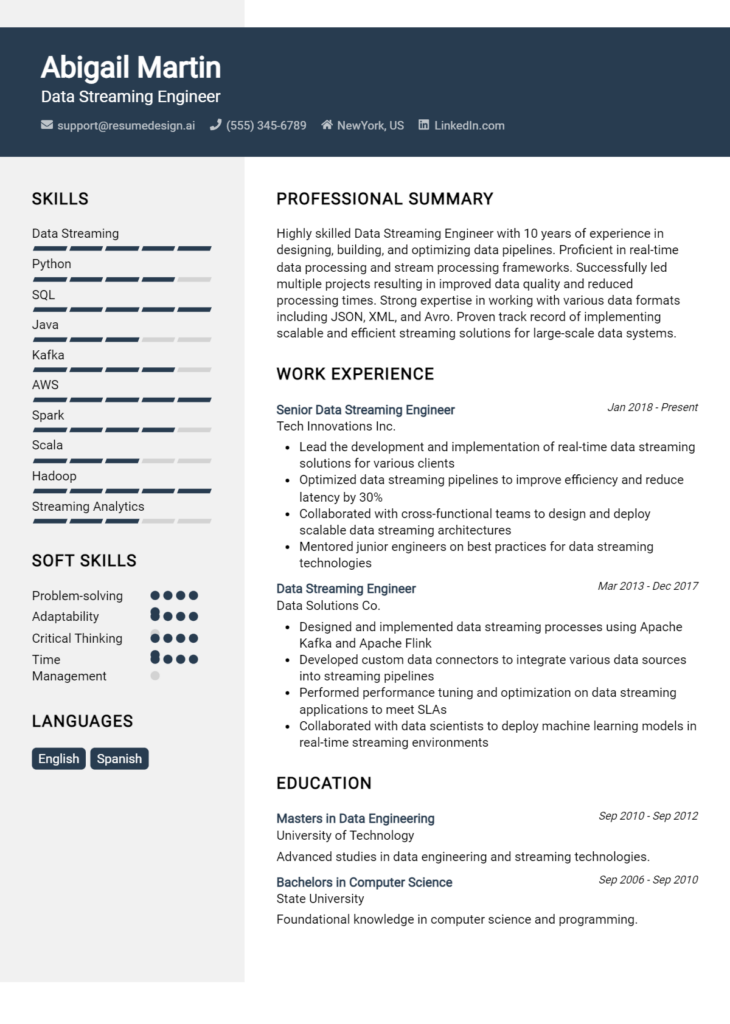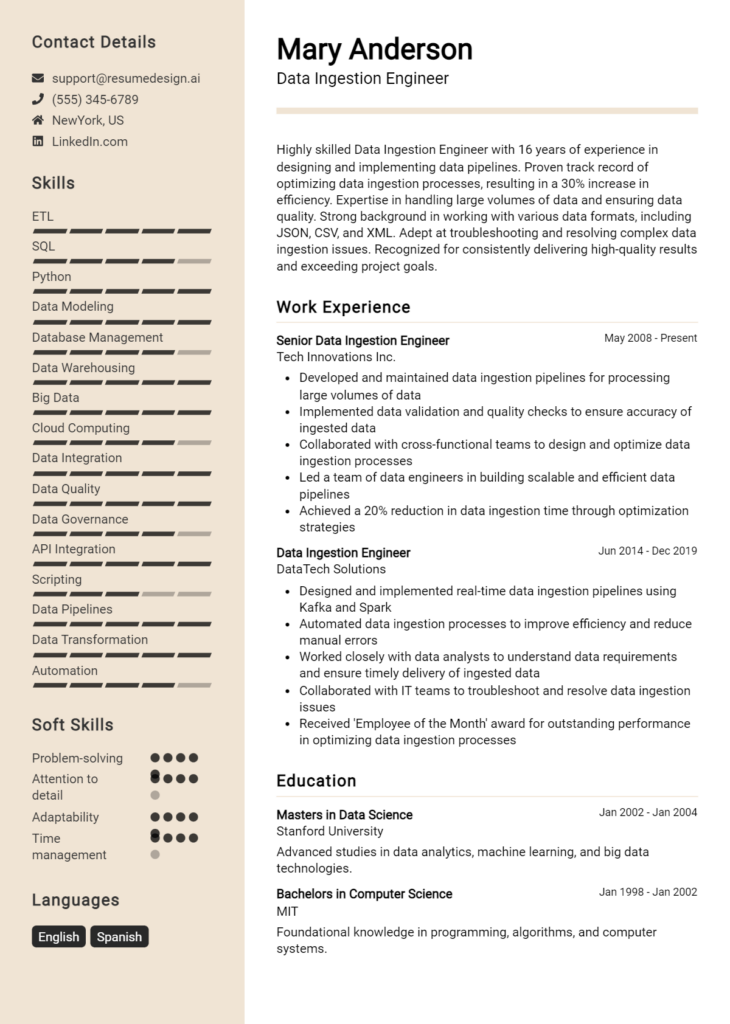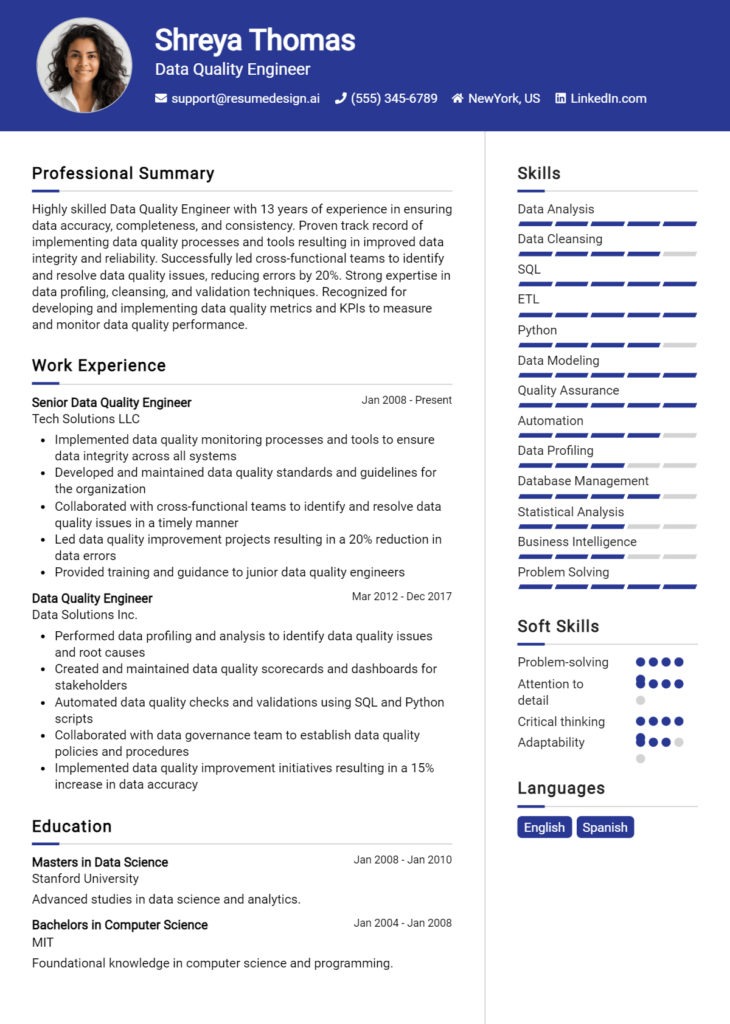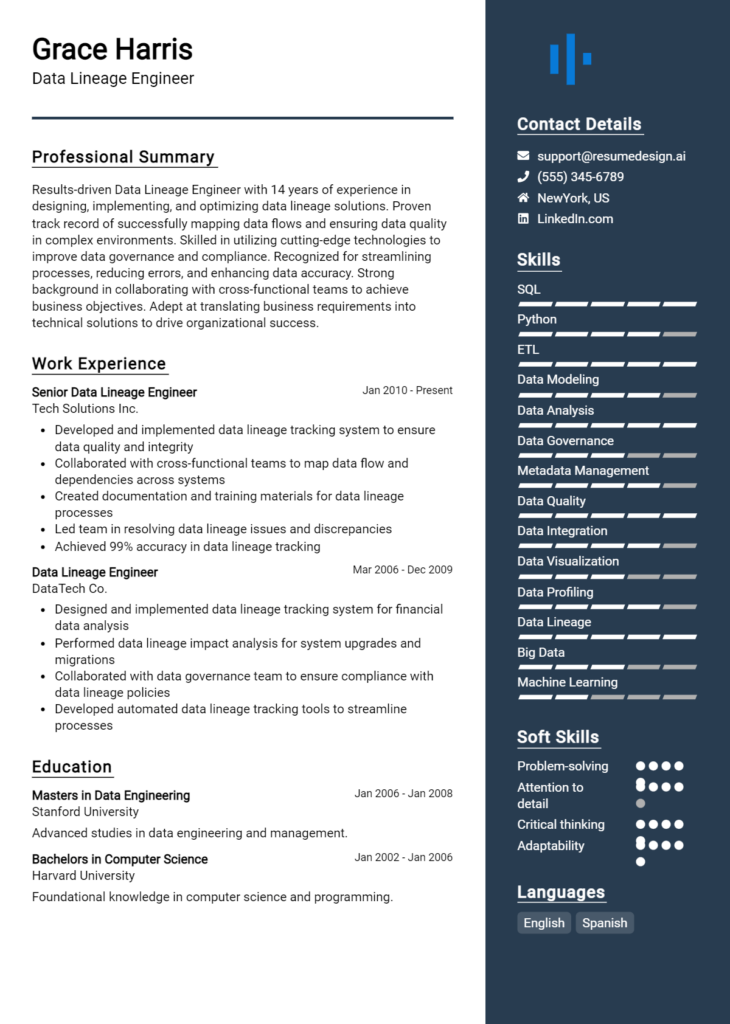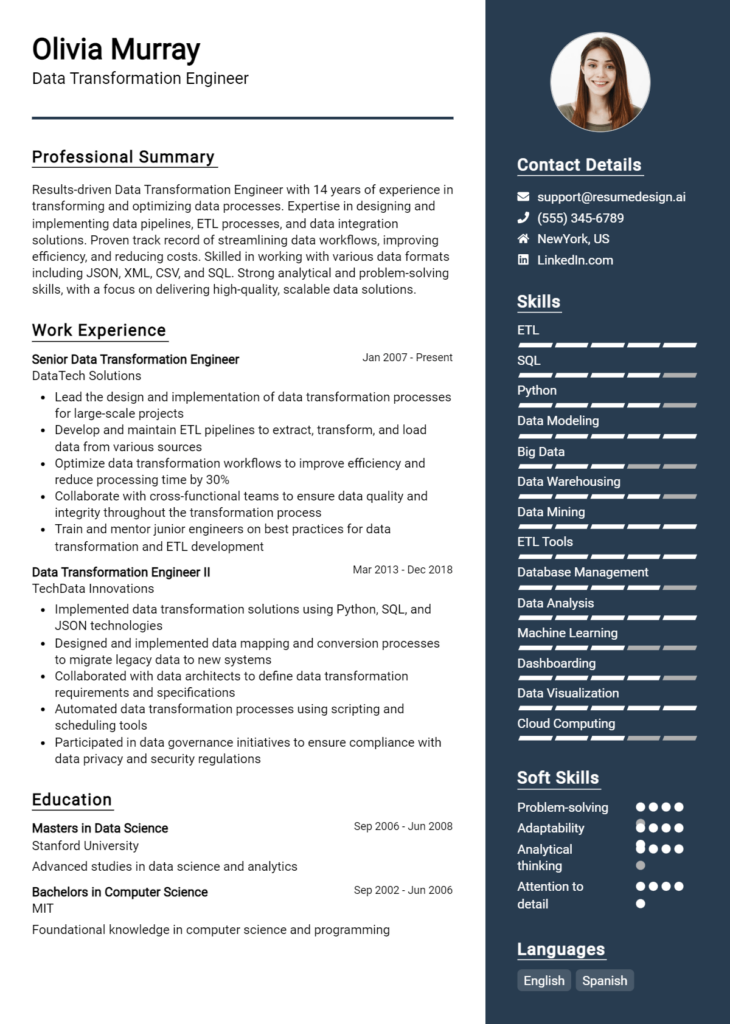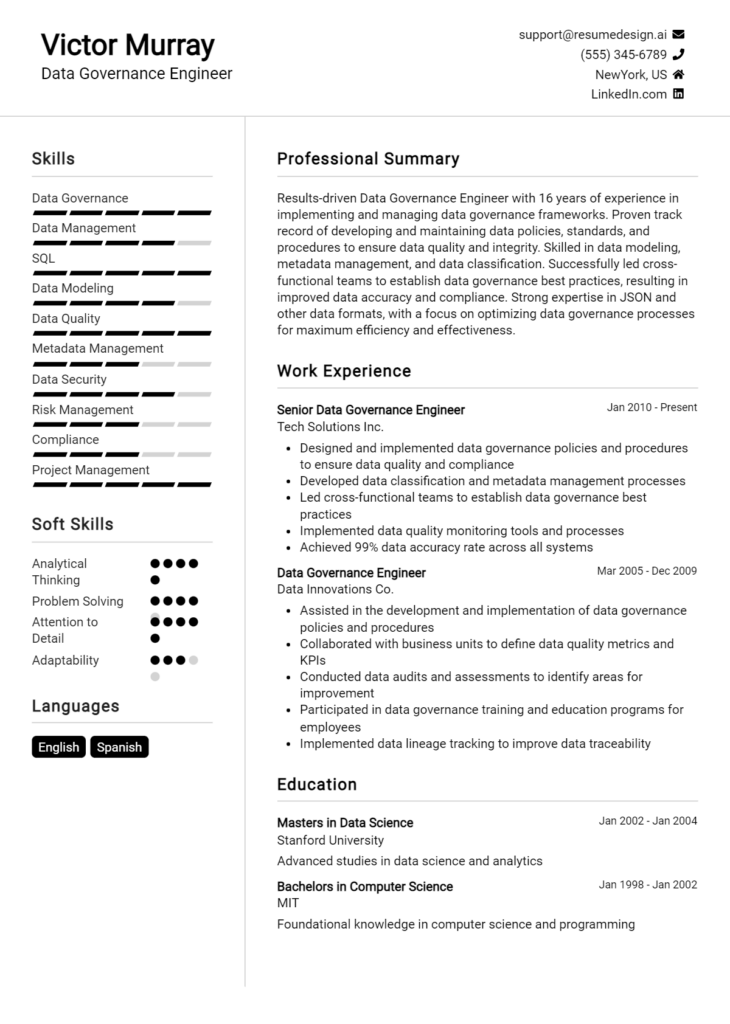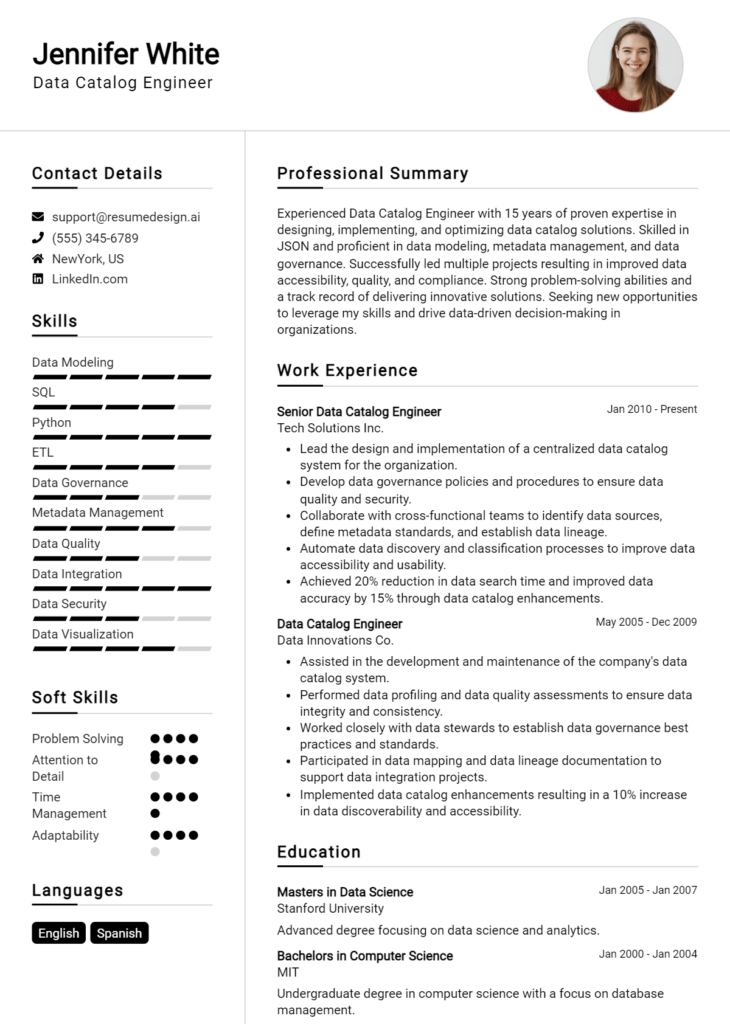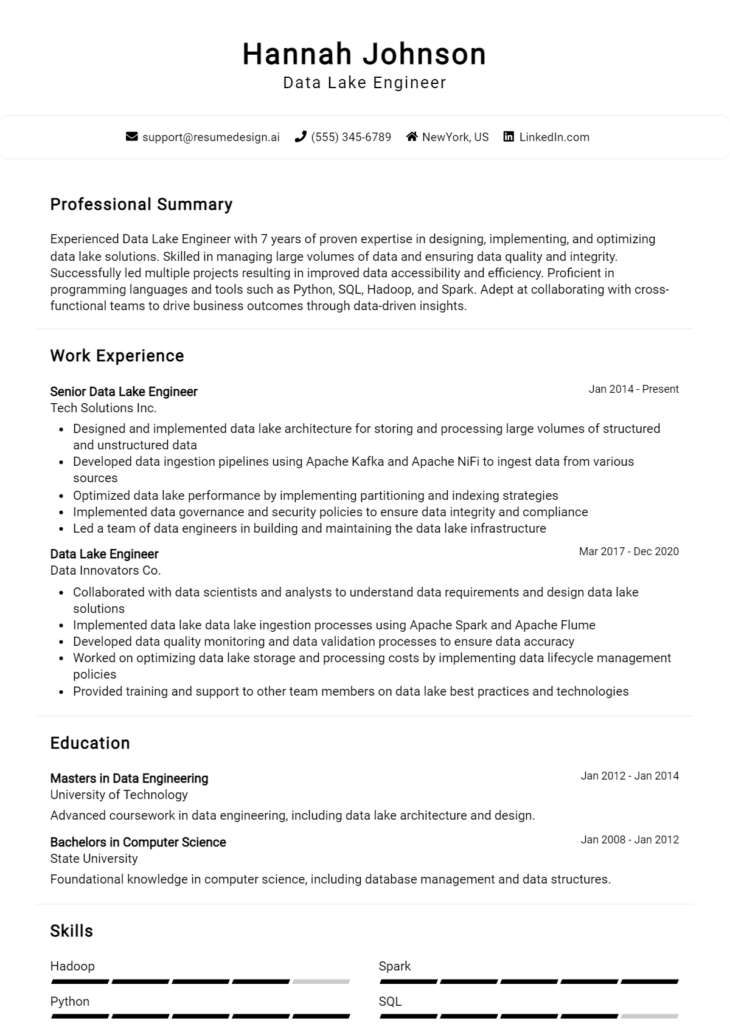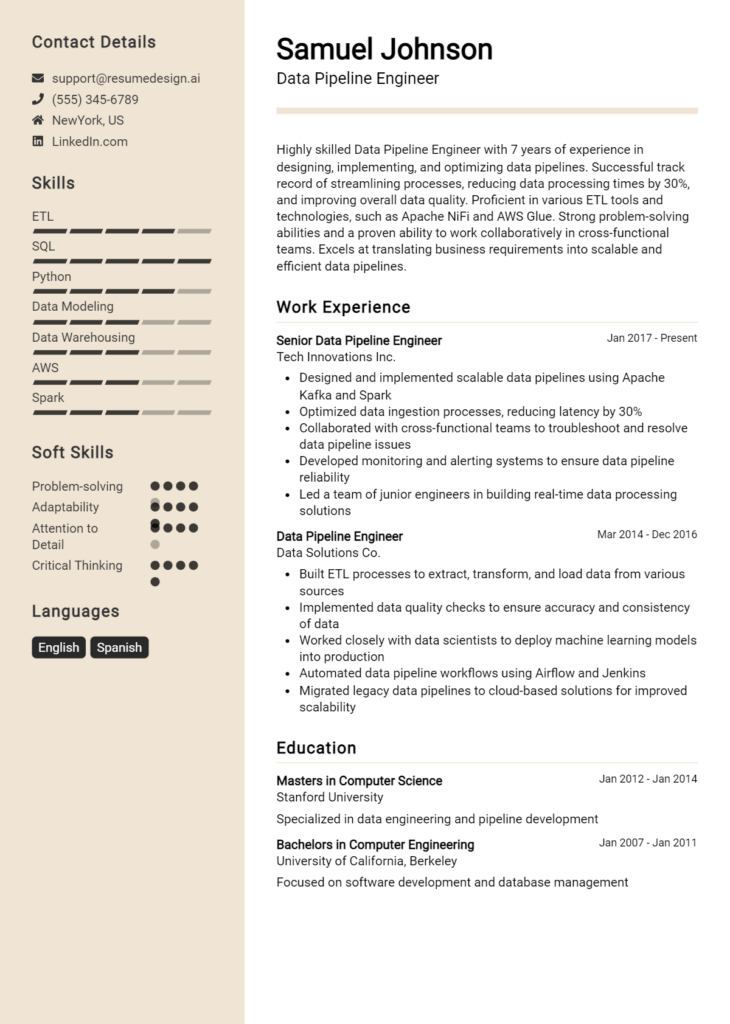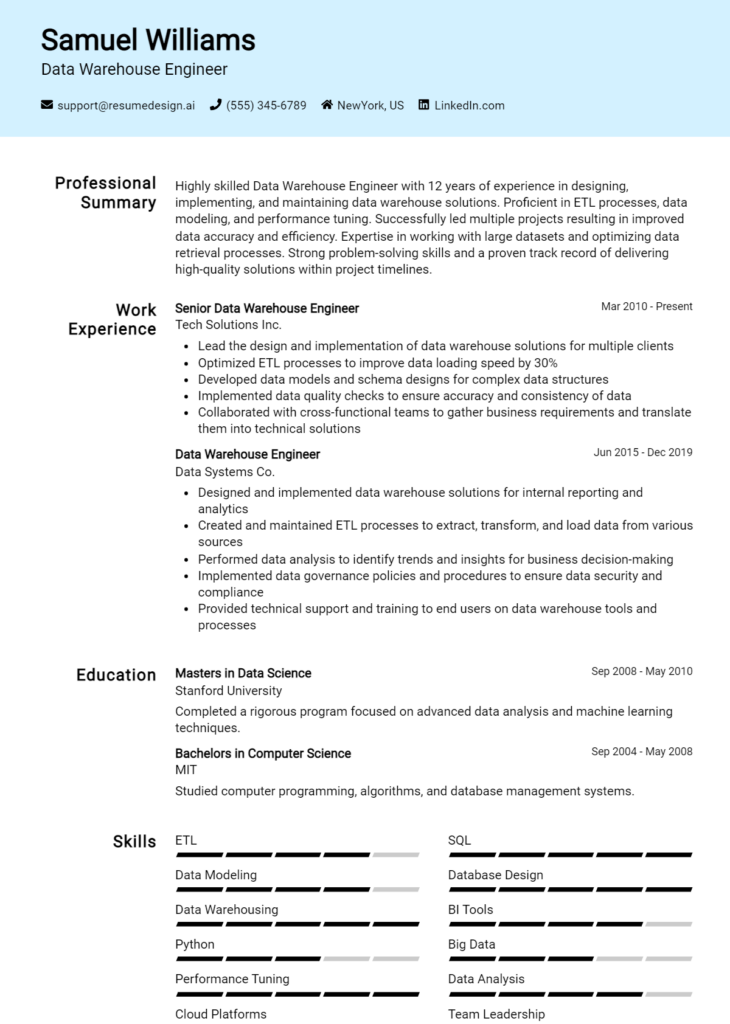Data Engineer Core Responsibilities
Data Engineers play a crucial role in organizations by bridging various departments through the design, construction, and maintenance of robust data pipelines and architectures. They possess strong technical skills in programming, database management, and cloud technologies, alongside operational expertise in data governance and data modeling. Problem-solving abilities are essential for troubleshooting and optimizing data workflows. These competencies are vital for achieving organizational goals, and a well-structured resume can effectively highlight these qualifications to prospective employers.
Common Responsibilities Listed on Data Engineer Resume
- Designing and implementing scalable data pipelines.
- Developing and maintaining ETL processes.
- Ensuring data quality and integrity through validation techniques.
- Collaborating with data scientists and analysts to meet data needs.
- Optimizing database performance for large-scale data processing.
- Implementing data storage solutions using cloud technologies.
- Monitoring and troubleshooting data flow issues.
- Creating documentation for data workflows and processes.
- Integrating data from multiple sources for analytics.
- Staying updated on industry trends and data technologies.
- Participating in data governance and compliance initiatives.
High-Level Resume Tips for Data Engineer Professionals
In the competitive landscape of data engineering, a well-crafted resume serves as a critical tool for making a strong first impression on potential employers. As the initial point of contact, your resume must effectively showcase not only your technical skills but also your achievements and contributions to previous projects. A carefully tailored resume can set you apart from fellow candidates, demonstrating your understanding of the role and the unique value you bring to the table. This guide will provide practical and actionable resume tips specifically designed for Data Engineer professionals looking to enhance their chances of securing an interview and, ultimately, a job offer.
Top Resume Tips for Data Engineer Professionals
- Tailor your resume to each job description by incorporating relevant keywords and phrases that align with the role.
- Highlight your technical skills prominently, including programming languages (e.g., Python, Java), database management systems (e.g., SQL, NoSQL), and big data technologies (e.g., Hadoop, Spark).
- Showcase relevant experience by detailing specific projects you’ve worked on, emphasizing your role and the technologies used.
- Quantify your achievements wherever possible, using metrics to demonstrate the impact of your work (e.g., improved data processing speed by 30%).
- Include certifications or training relevant to data engineering, such as AWS Certified Data Analytics or Google Cloud Professional Data Engineer.
- Utilize a clean and professional format that enhances readability, making it easy for hiring managers to find key information quickly.
- Incorporate a summary or objective statement that clearly outlines your career goals and what you can offer to potential employers.
- Highlight soft skills, such as problem-solving, teamwork, and communication abilities, as these are crucial in collaborative data engineering environments.
- Keep your resume concise, ideally one page, ensuring that every word serves a purpose and adds value.
By implementing these tips, Data Engineer professionals can significantly enhance their resumes, improving their chances of landing interviews and securing positions in a rapidly evolving field. A well-structured, tailored resume not only captures the attention of hiring managers but also effectively communicates your qualifications and readiness for the challenges of data engineering roles.
Why Resume Headlines & Titles are Important for Data Engineer
In the competitive field of data engineering, the importance of a well-crafted resume headline or title cannot be overstated. This crucial element serves as the first impression for hiring managers, encapsulating a candidate's key qualifications in a concise and impactful phrase. A strong headline not only grabs attention but also provides a snapshot of the candidate's expertise, making it easier for recruiters to quickly assess their suitability for the role. It should be relevant to the position being applied for, allowing the candidate to stand out among a sea of applicants with similar backgrounds.
Best Practices for Crafting Resume Headlines for Data Engineer
- Keep it concise: Aim for a headline that is no longer than 10-12 words.
- Be role-specific: Tailor the headline to match the specific data engineering position.
- Highlight key skills: Incorporate relevant technical skills that align with the job description.
- Use action verbs: Start with strong action words to convey impact and proactivity.
- Incorporate years of experience: Mentioning your experience level can add credibility.
- Include relevant certifications: If you have certifications, consider including them in your headline.
- Avoid buzzwords: Steer clear of generic phrases that do not add value.
- Make it unique: Aim for a headline that sets you apart from other candidates.
Example Resume Headlines for Data Engineer
Strong Resume Headlines
"Experienced Data Engineer Specializing in Big Data Solutions and ETL Processes"
“Data Engineer with 5+ Years in Cloud Data Warehousing and Analytics”
“Innovative Data Engineer Skilled in Python, SQL, and Machine Learning Implementations”
Weak Resume Headlines
“Data Engineer Looking for a Job”
“Experienced Professional”
Strong headlines are effective because they clearly communicate the candidate’s unique qualifications and specific expertise in data engineering, making them immediately relevant to the hiring manager. In contrast, weak headlines fail to impress due to their vagueness and lack of detail, which can leave hiring managers uncertain about the candidate's true abilities or fit for the role. A compelling headline not only attracts attention but also sets a positive tone for the rest of the resume.
Writing an Exceptional Data Engineer Resume Summary
A well-crafted resume summary is essential for a Data Engineer, as it serves as the first impression for hiring managers. This brief yet powerful section quickly captures attention by highlighting key skills, relevant experience, and notable accomplishments tailored to the specific job application. A strong summary not only showcases the candidate's technical abilities and successes but also sets the tone for the rest of the resume, making it crucial to be concise and impactful.
Best Practices for Writing a Data Engineer Resume Summary
- Quantify Achievements: Use numbers to illustrate your impact, such as the percentage of performance improvement or the size of the datasets managed.
- Focus on Skills: Highlight the most relevant technical skills and tools you have experience with, such as SQL, Python, or big data technologies.
- Tailor to Job Description: Customize your summary to align with the specific requirements and responsibilities outlined in the job listing.
- Keep it Concise: Aim for 2-4 sentences that convey your value without overwhelming the reader.
- Use Action Words: Start with strong verbs that demonstrate your proactive role in past projects, such as "developed," "implemented," or "optimized."
- Showcase Relevant Experience: Include specific experiences that are directly applicable to the Data Engineer role you are applying for.
- Avoid Jargon: While technical language is important, ensure that your summary remains accessible to non-technical hiring managers.
- Highlight Soft Skills: Don’t overlook the importance of communication, teamwork, and problem-solving abilities that are essential in collaborative environments.
Example Data Engineer Resume Summaries
Strong Resume Summaries
Results-driven Data Engineer with over 5 years of experience in designing and implementing data pipelines, achieving a 30% increase in data processing efficiency. Proficient in SQL, Python, and Apache Spark, with a proven track record of optimizing data workflows for large-scale applications.
Detail-oriented Data Engineer skilled in ETL processes and data modeling, successfully migrating a 10TB legacy database to a cloud-based solution, reducing retrieval times by 40%. Adept in using AWS and Tableau to deliver actionable insights to stakeholders.
Innovative Data Engineer with expertise in big data technologies, including Hadoop and Kafka. Spearheaded a project that enhanced real-time data processing capabilities, leading to a 25% increase in customer satisfaction scores.
Weak Resume Summaries
Experienced in data engineering and looking for a new opportunity to apply my skills in a challenging environment.
Data Engineer with knowledge of various tools and technologies, seeking to contribute to a team.
The examples of strong resume summaries effectively highlight specific accomplishments, quantify results, and directly relate to the Data Engineer role, showcasing the candidate's expertise and impact. In contrast, the weak summaries are vague, lack specific achievements or metrics, and do not convey a clear picture of the candidate's qualifications, making them less engaging for hiring managers.
Work Experience Section for Data Engineer Resume
The work experience section of a Data Engineer resume is critical as it serves as the primary showcase of a candidate's technical skills and professional journey. This section not only highlights the candidate's expertise in data engineering tools and technologies but also demonstrates their ability to manage teams and deliver high-quality products. By quantifying achievements and aligning past experiences with industry standards, candidates can effectively illustrate their value to potential employers, showcasing how they have contributed to organizational success through data-driven solutions.
Best Practices for Data Engineer Work Experience
- Highlight relevant technical skills such as ETL processes, data warehousing, and database management.
- Use quantifiable achievements to demonstrate impact, such as reducing data processing time by X%.
- Include specific technologies and tools used, such as Apache Spark, AWS, or SQL.
- Showcase collaboration and teamwork by mentioning cross-functional projects.
- Tailor experiences to align with the job description and industry standards.
- Use action verbs to convey a sense of initiative and leadership.
- Focus on outcomes and results rather than just responsibilities.
- Keep descriptions concise and focused on the most relevant experiences.
Example Work Experiences for Data Engineer
Strong Experiences
- Led a team of 5 engineers to design and implement a data pipeline that reduced data ingestion time by 40%, improving real-time analytics capabilities.
- Developed a data warehouse solution using AWS Redshift that centralized data from multiple sources, resulting in a 30% increase in report generation efficiency.
- Collaborated with data scientists to optimize machine learning model performance, leading to a 25% increase in predictive accuracy through enhanced data preprocessing.
Weak Experiences
- Worked on various data projects involving databases.
- Assisted in team efforts to improve data management.
- Involved in some data-related tasks without clear outcomes.
The examples listed as strong experiences stand out due to their focus on quantifiable results, specific technologies utilized, and the demonstration of leadership and teamwork. These statements provide clear evidence of the candidate's impact on previous employers. Conversely, the weak experiences lack detail, specificity, and measurable outcomes, making them less compelling and failing to effectively communicate the candidate's contributions and expertise in the field.
Education and Certifications Section for Data Engineer Resume
The education and certifications section of a Data Engineer resume plays a crucial role in showcasing the candidate's foundational knowledge and commitment to professional development. This section provides an opportunity to highlight academic qualifications, industry-relevant certifications, and ongoing learning endeavors, all of which are essential in the fast-evolving field of data engineering. By detailing relevant coursework, specialized training, and recognized credentials, candidates can significantly enhance their credibility and demonstrate their alignment with the specific demands of the job role.
Best Practices for Data Engineer Education and Certifications
- Include only relevant degrees and certifications that pertain to data engineering and related fields.
- Highlight advanced degrees (e.g., Master's, Ph.D.) or specialized certifications that stand out in the industry.
- Detail relevant coursework that demonstrates knowledge of key technologies, tools, and methodologies used in data engineering.
- List certifications from recognized organizations (e.g., AWS, Google Cloud, Microsoft) that validate your skills and expertise.
- Keep the format consistent and easy to read, using bullet points to make information digestible.
- Update this section regularly to reflect any new qualifications or completed courses.
- Consider adding a brief description of each certification or degree to explain its relevance.
- Showcase any hands-on training or boot camps that provide practical experience with data engineering tools.
Example Education and Certifications for Data Engineer
Strong Examples
- M.S. in Computer Science, University of California, Berkeley – Focus on data systems and machine learning.
- AWS Certified Data Analytics – Specialty, Amazon Web Services – Validates skills in data analysis and visualization.
- Google Cloud Professional Data Engineer Certification – Demonstrates proficiency in Google Cloud Platform data services.
- Relevant Coursework: Advanced SQL, Data Warehousing, Big Data Technologies, and ETL Processes.
Weak Examples
- B.A. in Philosophy, University of XYZ – Not relevant to data engineering.
- Certification in Basic Computer Skills – Too general and not industry-specific.
- Outdated certification in Oracle 9i – Lacks relevance to current data engineering practices.
- High School Diploma – Does not provide sufficient information for a Data Engineer position.
The strong examples listed above are considered effective because they directly align with the skills and knowledge required for a Data Engineer role, showcasing advanced degrees and recognized certifications that validate the candidate's expertise. In contrast, the weak examples are viewed as ineffective due to their lack of relevance to data engineering, outdated information, or overly general qualifications that do not demonstrate the necessary technical skills or industry-specific knowledge.
Top Skills & Keywords for Data Engineer Resume
A well-crafted resume is crucial for any Data Engineer, as it serves as a first impression to potential employers. Highlighting the right skills can significantly enhance your chances of landing an interview, as these competencies demonstrate your ability to manage, analyze, and optimize data systems effectively. In a rapidly evolving tech landscape, showcasing both hard and soft skills is essential to illustrate not just your technical expertise but also your ability to work collaboratively in a team environment. By incorporating relevant skills into your resume, you can present a well-rounded profile that aligns with the demands of the role.
Top Hard & Soft Skills for Data Engineer
Soft Skills
- Problem-solving
- Communication
- Team collaboration
- Adaptability
- Critical thinking
- Attention to detail
- Time management
- Creativity
- Interpersonal skills
- Analytical mindset
Hard Skills
- SQL and NoSQL databases
- Data warehousing solutions (e.g., Amazon Redshift, Google BigQuery)
- ETL (Extract, Transform, Load) processes
- Programming languages (e.g., Python, Java, Scala)
- Big data technologies (e.g., Hadoop, Spark)
- Cloud platforms (e.g., AWS, Azure, GCP)
- Data modeling and architecture
- Data pipeline construction and management
- Machine learning fundamentals
- Version control systems (e.g., Git)
By focusing on these key skills and tailoring your resume to reflect your work experience, you enhance your visibility to employers and position yourself as a competitive candidate in the data engineering field.
Stand Out with a Winning Data Engineer Cover Letter
I am excited to apply for the Data Engineer position at [Company Name] as advertised on [Job Board/Company Website]. With a solid foundation in data architecture, ETL processes, and a passion for leveraging data to drive business decisions, I am confident in my ability to contribute effectively to your team. My experience in designing scalable data pipelines and optimizing data workflows aligns perfectly with your company’s mission to harness data for innovative solutions.
In my previous role at [Previous Company Name], I successfully architected and implemented a data pipeline that reduced data processing time by 30%. This was achieved through the integration of Apache Spark and AWS services, allowing for real-time analytics that empowered stakeholders to make informed decisions swiftly. My proficiency in SQL, Python, and Hadoop, combined with my hands-on experience with cloud platforms, has equipped me with the technical skills necessary to tackle complex data challenges and drive efficiency in data management.
Collaboration is at the heart of effective data engineering, and I thrive in team environments where I can share insights and learn from others. I have worked closely with data scientists and analysts to ensure data quality and accessibility, facilitating better reporting and analytics. My ability to communicate technical concepts to non-technical stakeholders has allowed me to bridge gaps between teams and foster a culture of data-driven decision-making.
I am particularly drawn to [Company Name] because of your commitment to innovation and excellence in data utilization. I am eager to bring my skills in data engineering to your organization and help you unlock the full potential of your data assets. Thank you for considering my application; I look forward to the opportunity to discuss how I can contribute to your team.
Common Mistakes to Avoid in a Data Engineer Resume
Crafting a standout resume is crucial for landing a data engineer position, yet many candidates fall into common pitfalls that can undermine their chances of success. A well-structured resume should effectively showcase your technical skills, experience, and understanding of data systems, but errors or omissions can detract from your qualifications. Here are some common mistakes to avoid when creating your data engineer resume:
Vague Job Descriptions: Using generic terms instead of specific technologies or methodologies can make your experience seem less relevant. Clearly mention the tools and frameworks you've worked with, such as Apache Spark, SQL, or ETL processes.
Ignoring Keywords: Failing to include industry-specific keywords can lead to your resume being overlooked by Applicant Tracking Systems (ATS). Tailor your resume to match the job description by incorporating relevant terms.
Lack of Quantifiable Achievements: Merely listing responsibilities without quantifying your contributions misses the chance to demonstrate your impact. Use metrics and data to illustrate how your work improved processes, such as "reduced data processing time by 30%."
Overloading with Technical Jargon: While it's essential to showcase your technical expertise, using excessive jargon can alienate non-technical recruiters. Strike a balance by explaining complex concepts in an accessible manner.
Neglecting Soft Skills: Data engineers often collaborate with cross-functional teams, so highlighting soft skills like communication, problem-solving, and teamwork is important. Don’t focus solely on technical skills; show your ability to work well with others.
Outdated Information: Including outdated technologies or skills that are no longer relevant can make you appear disconnected from current trends. Regularly update your resume to reflect your latest skills and experience.
Poor Formatting: A cluttered or confusing layout can detract from your content. Use clear headings, bullet points, and a clean design to improve readability and allow hiring managers to quickly find key information.
Failing to Customize for Each Application: Sending the same resume for every job application can be detrimental. Tailor your resume for each position by emphasizing the experiences and skills that are most relevant to that specific role.
Conclusion
As we’ve explored throughout this article, the role of a Data Engineer is crucial in today’s data-driven landscape. From designing robust data architectures to ensuring efficient data pipelines, Data Engineers play a vital part in transforming raw data into actionable insights. Key skills such as proficiency in programming languages (like Python and Java), familiarity with big data technologies (such as Hadoop and Spark), and a strong understanding of database systems are essential for success in this field.
Moreover, it’s important to showcase your projects and experiences effectively on your resume to stand out in a competitive job market. A well-structured resume highlights your technical skills, relevant work experience, and any certifications that can give you an edge over other candidates.
To ensure your resume accurately reflects your qualifications and makes a strong impression, we encourage you to take some time to review and update it. Consider utilizing the various resources available to enhance your application materials. You can find helpful resume templates, an easy-to-use resume builder, inspiring resume examples, and professional cover letter templates.
Take action today to refine your resume and improve your chances of landing that coveted Data Engineer position!

